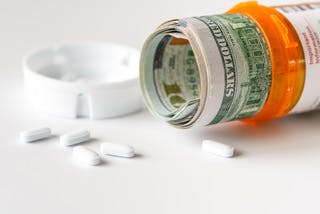Dec 14, 2020
Why Are Prescription Drugs So Expensive?

It’s not so much why are prescription drugs so expensive – The real question is, why are prescription drugs so incredibly costly in the U.S? We all know the frustration of going to pick up our prescription at the pharmacy and reeling in shock when we discover the price.
Imagine you were filling out a prescription for the drug, Humira, a medication commonly used to treat conditions like psoriasis and arthritis. Your Humira prescription here will run you a mind-boggling, $2,669 but what if you knew that the same prescription would cost you significantly less in other countries? In the United Kingdom, you will be able to get the same drug for $1, 362, almost half what of it would it would cost you here, and in Switzerland the savings would be even greater, costing you only $822.
So, how can this be?
Why is the Same Prescription Drug So Much More Expensive in the U.S.?
Are we getting some upgraded form of the drug, or are we getting privately serenaded by our favorite singer as we go to pick up our drug, here? How can the same, exact drug cost so much more in this country? Well, the answer has nothing to do with the drug. It comes down to the way the healthcare and pharmaceutical industry systems work in this country and their lack of regulations.
In the United States, pharmaceutical companies are given the freedom to establish their own pricing on their products. As long as their drug is proven to be safe by the Food and Drug Administration, it is allowed entry into the U.S. market, and whatever the cost that the pharmaceutical company has decided on, is what it will cost you. And obviously, this causes a whole host of problems, from incredibly expensive co-pays for your medication at the drug store, to people unfortunately digging a whole into their savings simply to afford medications they need to save their lives.
So clearly, there is an error with the current system. But unfortunately, the answer isn’t just to haggle with pharmaceutical companies to lower their prices. The argument is that there is a give-and-take to the current system. With deregulation and pharmaceutical companies allowed to set their own prices, investors are incentivized to fund medical research for new drugs and medical innovations – the profits being potentially extremely attractive, with prices so high. This means that if prices of drugs were lowered, investors may be more likely to put their money towards a shiny new tech startup rather than fund efforts to discover new medical cures.
Essentially, the deregulated market of the U.S. is funding the world’s medical research for medical advances and treatments. And while we suffer being faced with exorbitant costs, the rest of the world benefits, having access to our innovative drugs with lower prices.
What Does Regulation of the Health Care and Pharmaceutical Industry Look Like, Then?
In other countries, in which their health care systems are regulated, a government agency will be brought in to help negotiate with the pharmaceutical companies to bring down their prices to appropriate costs. And in addition, to helping barter with pharmaceutical companies to drop their prices, they will survey the drugs and make decisions about how they should be priced based on whether the new drugs bring any improvements over older versions – or if they should go to market at all, for that matter. They will also analyze the risks and side effects of new drugs, weighing them against their potential benefits.
This sounds great, right? Well like anything, there is a trade-off with a system that is regulated in this way, as well. With more considerations about whether a drug will even enter the market in other countries, this likely means that less drugs will be produced there. So, it can very well be that there will be a drug you have access to here (if you can afford it) that you won’t be able to get at all in other countries – because it didn’t pass safety regulations there. However, what difference does it make if you have more access to drugs here, but aren’t able to afford them?
Beyond that, with less safety regulations and policies in play to weed out drugs that are less effective here, drugs that may not actually offer that many benefits, but have fancy PR and expensive marketing behind them will still be able to enter the U.S. market. This means, you could end up paying exorbitant prices for a drug here, that isn’t even proven to be effective.
Higher Innovation vs More Access
The underlying conundrum facing drug pricing policies here is the question of what should be valued more – funding new drugs and potential new cures for the future or making drugs currently on the market more accessibly priced, so patients who are suffering from various ailments now, can afford the cures they need?
How do we reconcile this dilemma? Should we as a country agree that it is tolerable to pay more for drugs here, knowing the world’s medical research will benefit from our dollars? Or should we trade some innovation to help U.S. citizens of all income levels more comfortably afford drugs they need now?
If you need help paying for your prescription drugs, sign up for CareCard today.